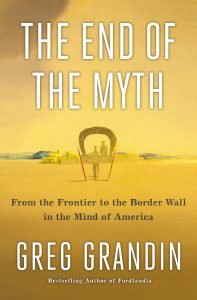The Myth of American Exceptionalism is Dying, and that is a Good Thing
In the study of religion, “myth” does not mean “untruth” or “false.” It is a word associated with the deep story in which a people live, the well-springs of a culture. One of the founding, and maybe the most powerful, myth of American life has been exceptionalism. That is the story of being a unique people, a people set apart from the monarchs and superstitions of the Old World by a great ocean, a people more divinely blessed than any other nation, a people defined both by virtue and by greatness.
According to this myth, an action is good because we do it and because we only do good in the world. Our motives are always pure. According to this myth, the U.S. has been called by God to global leadership. While presidents and presidential candidates buy into this myth more or less (and the current president is on the extreme edge of “more”), it is difficult to imagine a candidate being elected without embracing something of the exceptionalism of the American people, way of life, and role in the world. Such is the power of the myth of exceptionalism.
 It is a myth that needs to die. Indeed, it is dying, and its death-throe is a major undercurrent in our society’s polarization, conflict, and other-hatred. Greg Grandin begins his excellent book, The End of the Myth, with a haunting quote from Anne Carson, “To live past the end of your myth is a perilous thing.” In the U.S. today, there is plenty of peril.
It is a myth that needs to die. Indeed, it is dying, and its death-throe is a major undercurrent in our society’s polarization, conflict, and other-hatred. Greg Grandin begins his excellent book, The End of the Myth, with a haunting quote from Anne Carson, “To live past the end of your myth is a perilous thing.” In the U.S. today, there is plenty of peril.
The myth of exceptionalism is not simply white supremacy by another name but, in practice, it is shamefully close. The myth of exceptionalism was used to do violence against America’s indigenous peoples. It was one of the essentials of both Yankee and plantation states practicing the triangle trade and a slave-labor economy. It was utilized to war against Mexico, acquire colonies, march indigenous peoples hundreds of miles from the lands their myths told them they were eternally connected to, and close borders and immigration several times to persons who were either non-white or not white enough.
The myth was reinforced by our genuine role in saving the world from totalitarianism during World War II, and many in my parents’ generation cling to the myth. I hoped that Vietnam would shred the myth, put the lie to the claim that America is always on the side of good and right, and always innocent of the atrocities other nations commit during wars. But President Reagan promoted the myth effectively, and President George H.W. Bush covered the nation in the myth’s mantle when he said the first Gulf War was a “just war.” And the civil rights movements of the 1960s and 70s wounded the myth, but it survived.
The myth cannot hold. Despite the direction the nation has taken under its current leadership, white supremacy and American exceptionalism are being challenged like never before in my lifetime. Scholarship, street protests, history books (the stories we tell ourselves about ourselves), diversity-equity-inclusion trainings, racial bias awareness training for law enforcement, pipeline protests on Native lands, the election of persons of color, the nation’s demographics as we move toward a no racial-ethnic majority nation—all these are challenging the myth and chipping away at it. Oh, and let’s not forget what the federal government’s pandemic response might do to a myth of exceptionalism. Best in the world, are we?
The nation’s Christianities are choosing sides. Christian nationalist religion and the Christian Right are fiercely defending the myth. They are trying to create a forcefield, a new sacred canopy, over the myth of exceptionalism. They have power, and they’ve appointed a huge number of federal judges who will defend the myth.
But I smell whitewashed tombs.
Progressive Christian communities, not a few Catholic congregations, and America’s other faith groups smell the tombs, too—as do the growing number of non-religious folks (with the exception of white nationalists). We don’t believe the U.S. is a Chosen Nation.
We are the world’s most powerful nation that has and will use our power to protect our interests. Sometimes we play well with others in the world’s sandbox, but often we play only when we can set the rules. And we religious peoples claim the world’s nations are all human beings and creatures of the planet’s ecosystem first, and citizens/residents of particular nations second. This claim drains the life from American exceptionalism.
Now, there is an element of American exceptionalism that is worth attending to and nurturing. Some interpreters of what the U.S. is (and could be) point to the promises of the Declaration, the Constitution, and the matrix of a religiously, ethnically plural society that strives to incarnate liberty, equality, and justice for everyone. Add to this incarnation the spiritual consciousness of a shared humanity in a shared life-sphere we call Earth.
A democratic republic based on these values, of our size and demographics, would be exceptional in the history of the world. Such a vision has mythic possibilities.
As one myth ends, we move through the peril, in large part, by embracing another myth.


Leave a Reply